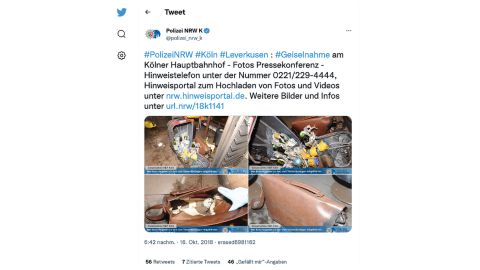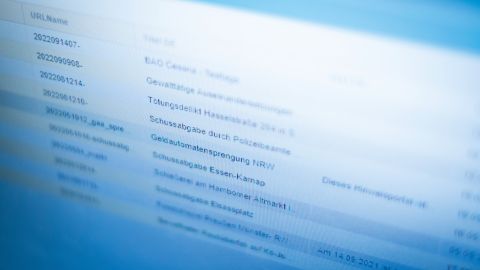October 15, 2018 is a Monday. Shortly before 1 p.m., the McDonalds at Cologne Central Station is bustling. The staff have their hands full with fries and burgers. That's probably why nobody notices the 55-year-old man - as it turns out later - squatting behind a clearing trolley and pouring gasoline. A little later, he throws a Molotov cocktail. Panic! People flee. A girl (14) slips in the puddle of petrol and suffers severe burns.
Every year, the police in North Rhine-Westphalia experience dangerous situations that end up on the tip-off portal. Here are a few examples from 2022: In September, there were the riots at FC Köln's Conference League Cup in Nice after fans cheered a spectator falling from the stands. That same evening, the Cologne police set up a "special organization" and asked the audience for video recordings and photos. In August, there was a knife attack at the Haus der Integration in Wuppertal, in which a man (20) stabbed a female employee (24). In May, the homicide squad asked the people of Duisburg for help after a shootout between the Hells Angels rocker group and a Turkish-Arab clan at the Altmarkt in Hamborn. 19 shots fired, four injured. Witnesses could upload selfies and video clips of up to two gigabytes that were taken during or after the crime via the "nrw.hinweisportal.de".
Where many people gather, it used to be easy for perpetrators to disappear under the cover of the crowd. In the age of Instagram, Twitter and the like, there is a good chance that they will appear in private videos recorded on location. Because they could help with the investigation, incident commanders are increasingly calling 0211-939-4123 of the LKA's cybercrime unit 41.2 after violent confrontations to order an internet hotline.
At the other end, Detective Inspector Marita Segin (34) picks up the phone. Her colleagues at the State Office of Criminal Investigation on Völklinger Straße in Düsseldorf also call her "Frau Hinweisportal" ("Ms. Hint-portal"). Segin has already activated 33 portals since 2018. Witnesses sent more than 35 gigabytes of data. The attack at Cologne Central Station five years ago was one of the first cases in the tip-off portal.
As with almost all major incidents, the situation in Cologne was initially confusing: Who was the arsonist? What did he want to achieve with the attack? Was there a threat of further attacks? Six months earlier, an Islamist attacker had attacked several people with a knife in Paris. For this reason, a terrorist background was also initially suspected in Cologne. In order to find out as much as possible as quickly as possible, the investigators asked all commuters and travelers who had been in the vicinity of the fast food restaurant at lunchtime and had taken photos for help: perhaps the arsonist happened to be in one of the pictures? Perhaps he had been talking to other people - possible accomplices?
"A crime knows no time," says Segin. That's why incident commanders can have the hotline switched on day and night, after 4 p.m. via the situation service at the LKA. It's very unbureaucratic. Segin only needs a short application form. She then puts a form online at the link nrw.hinweisportal.de within minutes. Witnesses then only have to click on the "Event" button and scroll to the correct keyword. In this case it was: "Arson attack at Cologne Central Station". Click. A clearly laid out page opens and witnesses can drag and drop photo and video files into a rectangular window. After being (temporarily) stored at the BKA, the data material is saved on the LKA's servers and processed and evaluated by the police departments.
In the area of organized crime, witnesses want to remain anonymous.
Marita Segin
A race against time. "The public's interest and willingness to help usually wanes a few days after an attack," observes Segin. And: "In the area of organized crime, witnesses want to remain anonymous." This is why it is possible to provide a name, address and telephone number on the website, but this is not mandatory.
The idea for the portal was born ten years ago after the attack on the Boston Marathon. Back then, hundreds of people were injured by nails and splinters when two brothers detonated explosive devices. They were caught because onlookers had filmed the scene on their smartphones regardless of the danger. "For the younger generation in particular, sharing life online is part of life today," says Segin. At the time, the Boston colleagues set up a tip portal to pool the data.
In Germany, too, investigators asked themselves how they would deal with a similar situation. The Federal Criminal Police Office created the technical infrastructure, which the federal states have also been able to access since 2018.
Hours after the attack in Cologne, special units overpowered the perpetrator in a pharmacy where he had entrenched himself and taken hostages. However, the background to the crime remained unclear.
The problem remains: how does the public find out that they can and should help? "Through good press work," says investigator Segin. In Cologne, newspapers as well as radio and television stations have repeatedly drawn attention to the information portal. At the same time, there were also posts on all social media channels.
Only one day after the crime, the police were able to reconstruct the course of events with blurred images. Because the perpetrator had lost his ID in the pharmacy, the investigators finally got his name: Mohammed R., an allegedly severely traumatized refugee from Syria who was addicted to pills and alcohol and lived in Neu-Ehrenfeld. There was apparently no connection to IS. The proceedings were provisionally discontinued in 2020 because the man is still not fit for questioning due to serious injuries.
Since then, "Frau Hinweisportal" has already opened over 30 new cases: Most recently in the case of 16-year-old Mouhamed D., who was shot dead in August. The Recklinghausen police headquarters were looking for witnesses. The police in NRW also rely on eyewitness videos in the fight against ATM burglars. A tip-off link has been available since May. And as always, Marita Segin hopes that some witness happens to be in the right place at the right time at night.

